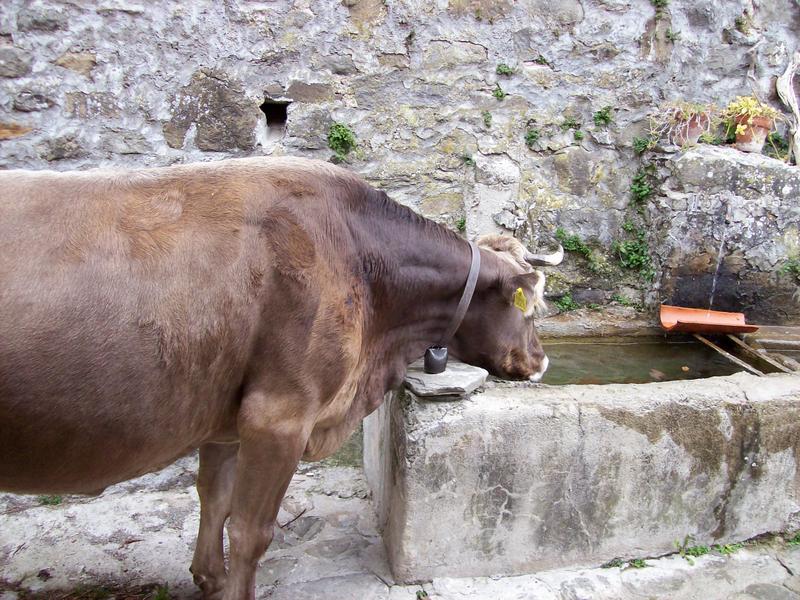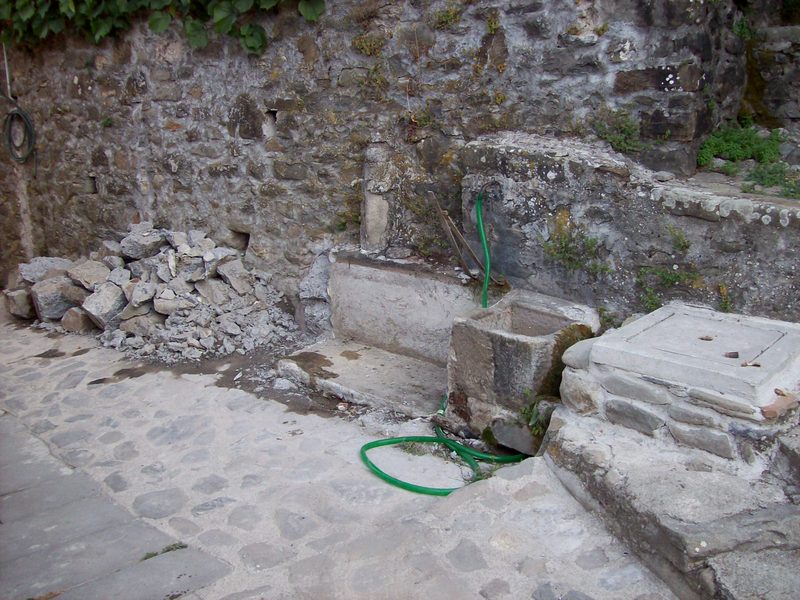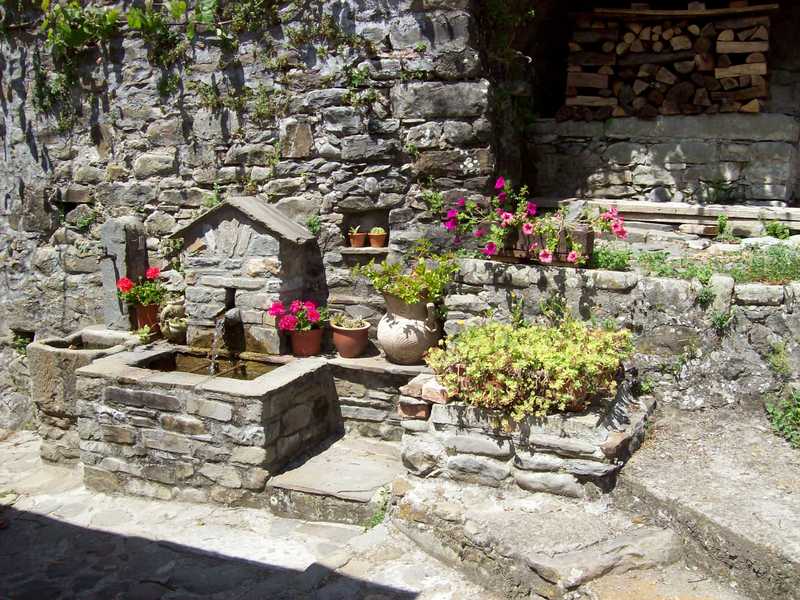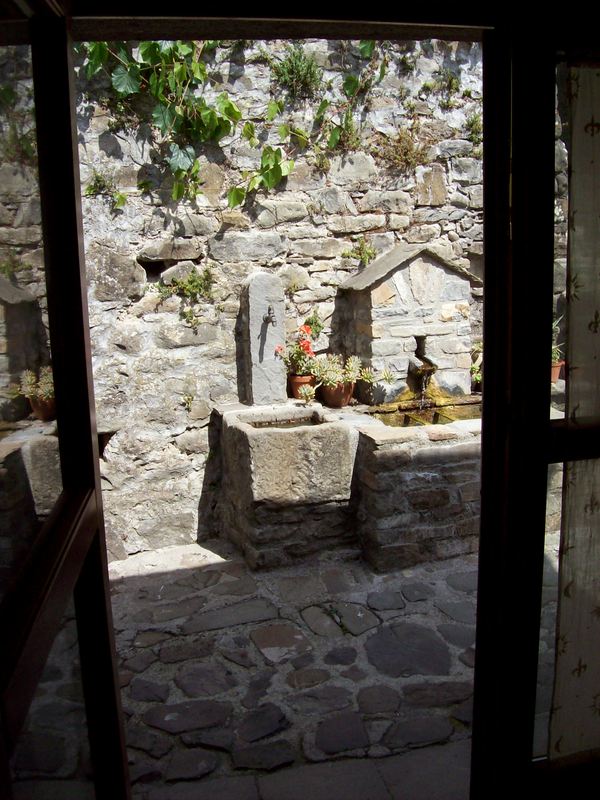Heard Of Cows? Posted by Geoff on Dec 11, 2017 in Italian Language
Heard of cows/herd of cows, get it? Well it could have been worse, I’d originally thought of calling this post ‘As One Cow Said To The Udder’!
But that’s enough silly wordplay for today. Last week Serena published Carolina And Marianna Go For Walk, and I felt that this charming little story merited not just a translation, but also a few explanatory notes. Here we go:
E’ una bella giornata di sole e cielo azzurro, anche se un po’ fredda, e così Carolina e Marianna decidono di fare un giretto per i paesi intorno, che non vedono da tanto tempo. Col loro passo lento e cadenzato si avviano per le vecchie strade acciottolate e strada facendo si fermano ad assaporare qualche erba che ancora resiste all’inverno.
It’s a beautiful day of sun and blue sky, even if a bit cold, and so Carolina and Marianna decide to go for a wander around the surrounding villages, which they haven’t seen for a while. With their slow measured pace they set off down the cobbled streets, and, along the way, stop to savour some grass that still resists the winter.
Notes:
Carolina and Marianna are two of the names traditionally given to cows in Italy.
Strada facendo is a common way of saying ‘along the way’, e.g. andavamo verso la stazione e strada facendo abbiamo incontrato Claudio = we were going towards the station and along the way we met Claudio.
Passano davanti alle case vuote e ormai abbandonate di Dina, Amelia e Adelina e scuotendo la testa sconsolate commentano:
Carolina: “Guarda qui, non c’è più nessuno! Questi paesi sono tutti vuoti. Ti ricordi quando eravamo in decine e decine per ciascun paese. Delle volte non si riusciva nemmeno a camminare lungo queste stradine strette, per la gran quantità di persone e animali che c’erano”.
They pass in front of the now empty and abandoned houses of Dina, Amelia and Adelina and, shaking their heads disconsolately, comment:
Carolina: “Look here, no one’s here anymore! These villages are all empty. Do you remember when there were dozens and dozens of us in each village. Sometimes you could hardly walk along these narrow streets due to the large quantity of people and animals that there were”.
Notes:
Dina, Amelia e Adelina are just three of the original inhabitants of our village that due to old age, disability or loneliness have moved into town to live with their children. At one time, nearly a hundred people inhabited our village, together with their cows, mules, sheep, chickens and so on. In 2017 the population of permanent residents is nine. There are other villages nearby with a population of just one or two old people.
decine e decine means tens and tens, but I’ve translated it into the more typically English ‘dozens and dozens’.
Marianna: “Eh, come me lo ricordo bene! Poi c’erano tanti bambini che giocavano sempre per la strada … correvano di qua e di là facendoti inciampare. Che tristezza oggigiorno!” dice sospirando.
Marianna: “Oh, I remember it very well! And then there were loads of children always playing in the street … they ran here and there, making you trip up. It’s so sad these days!” she says, sighing.
Notes:
Poi can be translated in various ways: ‘after’, ‘then’, ‘later’ as in the expression prima o poi (sooner or later) and in this case ‘what’s more’ or ‘and then’.
Carolina: “Guarda lì, la casa di Amelia … era così bella con la grande aia su cui mettevano ad asciugare il mais e pulivano le castagne secche per farci la farina, che poi conservavano nelle cantine”.
Carolina: “Look over there, Amelia’s house … it was so beautiful, with its big aia where they put the maize on to dry and cleaned the dried chestnuts to make flour, which they then stored in the cellar”.
Notes:
The aia is a flatten area of ground near the farmhouse used for threshing. In the area where we live it is usually paved with piagnoni, a dialect word for flagstones.
Marianna: “E di fronte ci sono le stalle e il pollaio, dove un tempo c’erano sempre tanti animali, il bellissimo gallo fiero del suo piumaggio … le nostre amiche Caterina e Guendalina. Eh, non è rimasto più nessuno!”
Marianna: “And in front there are the stables and the chicken coop, where once there were lots of animals, the beautiful cockerel, proud of his plumage … our friends Caterina and Guendelina. Oh dear, no one’s left!”
Notes:
Caterina and Guendelina are two more traditional Italian names for cows.
Quattro cani di piccola taglia si mettono ad abbaiare come disperati al passaggio di Carolina e Marianna.
“A quanto pare qualcuno è rimasto … sono solo quattro cani cani e senti che cagnara che fanno … e poi tutta la cacca per la strada. Pensa come doveva essere un tempo con tutti i cani, le pecore e le mucche che cerano!” commenta Carolina con un po’ meno nostalgia.
Four small dogs begin barking desperately as Carolina and Marianna pass by.
“It seems that there’s someone left … it’s only four dogs, and listen to the racket they make … and what’s more, all that shit in the street. Think what it must have once been like with all the dogs, the sheep, and the cows that there were!” comments Carolina with a bit less nostalgia.
Notes:
Sono solo quattro cani. Whereas in English we would say ‘it is only four dogs’, in Italian we say ‘they are only four dogs’. Another example is ‘sono solo cinque euro’ (‘they are only five euro’), where in English we’d say ‘it’s only five euros’
Cagnara, as the name suggests (cane hence cagnara), is the racket made by dogs, but it can also be used for a racket made by people.
Marianna: “Oh! Guarda Carolina, guarda che bella fontana! Ti ricordi quando qui c’era il vecchio abbeveratoio? Eravamo talmente in tanti qui in paese che Berto il muratore aveva dovuto costruirne uno più grande!”
Carolina: “Me lo ricordo bene! Era moderno, tutto in cemento armato … non bello, ma sicuramente pratico”
Marianna: “Oh! Look Carolina, look what a lovely drinking fountain! Do you remember when there was the old drinking trough? There were so many of us that Berto the builder had to build a bigger one!”
Carolina: “I remember it well! It was modern, made of reinforced concrete … not pretty, but definitely practical”
Notes:
abbeveratoio, the drinking trough, takes it name from the verb bere = to drink. We find the Latin root in the English word beverage.
Berto (Alberto), brother in law of the above mentioned Adelina, was the village builder. He died this year at the age of 95, having been active up until a couple of years before his death. Berto and Adelina lived together in friendship for many years after Adelina’s husband died. Adelina moved away to live with her daughter a few months after Berto’s death.
Marianna: “Questa fontana non basterebbe a nessuno, ma ormai non ci sono più animali. Dai, beviamo un sorso … Mm, com’è buona quest’acqua di sorgente!”
Carolina: “Sì, è proprio buona! … Guarda Marianna, ci stanno spiando dalla porta qui di fronte. Chi saranno? Senz’altro dei forestieri … qui una volta non ci abitava nessuno, era un fienile, non una casa.”
Marianna: “This drinking fountain wouldn’t be enough for anyone, but by now there are no animals left. Come on, let’s drink a bit … Mm, this spring water is really good!”
Carolina: “Yes, it’s really good! … Look, Marianna, they’re spying on us from the door here in front of us. Who could they be? Definitely outsiders … no one used to live here once, it was a barn, not a house.”
Notes:
un sorso is defined in il Vocabolario Treccani as “Quantità di liquido che si può mettere in bocca e ingoiare in una volta” = “amount of liquid that one can put in one’s mouth and swallow in one go”
Up here at 500 metres in the foothills of the Appennino Tosco-Emiliano our household water is collected from sorgenti (springs), and it’s very good! We have a famous sorgente just a couple of kilometres from here where people come from miles around to fill their bottles and damigiane (demijohns)
Forestieri, literally outsiders, is the word most commonly used for foreigners.
Marianna: “Guarda, ci stanno facendo la foto. Certamente dei forestieri … i contadini di qua non ci hanno mai fatto le foto. Dai, mettiamoci in posa per farli contenti”.
Dopo aver bevuto alla fontana del paese, le mucche Carolina e Marianna continuano la loro passeggiata lenta e placida accompagnate dal suono del campanaccio.
Marianna: “Look, they’re taking photos of us. They’re definitely foreigners … the peasants around here have never taken photos of us. Come on, let’s pose to keep them happy.”
After having drunk from the village drinking fountain, Carolina and Marianna the cows continue their slow peaceful walk accompanied by the sound of their cowbells.
Notes:
La fontana del paese. When we first moved here, the old abbeveratoio, built by Berto in the 50’s, was still there, but rather ugly and in very bad shape. The concrete had cracked, and water leaked out continually, infiltrating our house on the other side of the street. We decided to demolish it, and with the help of some of the locals rebuild a new fontana based on my design. In the process of demolishing the old trough, we unearthed the original stone abbeveratoio from several hundred years ago, which had been covered with cement when Berto built the ‘modern’ one.
The fontana which we built is now frequented by honey bees and pilgrims following the famous Via Francigena pilgrims route, which passes by our house.

Build vocabulary, practice pronunciation, and more with Transparent Language Online. Available anytime, anywhere, on any device.








Comments:
Rosalind:
Una fontana bellissima. Un vero lavoro d’artigiano italiano.
Donna:
Che bella fontana!
Ero sorpreso che i nostri narratori erano le mucche. (Non ho notato che hanno assaporato l’erba.) Era intenzionale?
Geoff:
@Donna Intenzionale? Un po’, sì.
Però, c’era la foto di Carolina che beve alla fontana, no? 😉
Mike Nicolucci:
Un’articolo spettacolare! Pieno di storia, cultura, umorismo, vocabolario e creatività.
Geoff:
@Mike Nicolucci Grazie mille Mike! 🙂
Heather:
Could you explain to me using “per” for “around” the surrounding villages. It surprised me! I can see in my big Collins dictionary that “per” is used lots of ways but it doesn’t say it is used as “around”. Is it something very colloquial? If so,could you give me some other examples? Thanks,
Heather.
Serena:
@Heather Salve Heather, per has got many different meanings. Look at this link: http://www.wordreference.com/iten/per and in particular check section n.8 ‘moto in luogo’. You can also double check this other link: http://www.wordreference.com/enit/around.
Saluti da Serena
Rosalind:
@Donna: à l’inizio della storia era scritto cusì
“Col loro passo lento e cadenzato si avviano per le vecchie strade acciottolate e strada facendo si fermano ad assaporare qualche erba che ancora resiste all’inverno.”
Mi fà pensare a una storia studiata in lingua corsa. C’erano 2 fratelli perseguiti da uomini con fucili. Un fratelli è stato ucciso alla vigilia e l’altro (il narratore) ci fà capire soltanto alla fine che sono cinghiali. Noi, di sicuro, abbiamo pensato a banditi o altri malfattori!
Kirstie Chippendale:
Che bellissima storia! Grazie e Buona natale
Geoff:
@Kirstie Chippendale Buon Natale anche a te! 🙂
Tony Sannella:
It’s nice that you put the Italian first and translation after. Makes it much easier to read. Thank you.
paolo:
grazie mille….
Maria elena:
Ciao Geoff. Come una studentessa di tua lingua, ti ringrazio moltissimo per queste storie così carine. Essendo mucche que raccontano le storie aggiunge a questa esperienza di lettura. Lo rende divertente per me. E , ho imparato nuovo vocabulario. Auguri per il anno nuovo. Sono molto contenta que trovai questo blog!!!😀
Geoff:
@Maria elena Ciao Maria Elena, non c’è di che! Comunque, è stata Serena a scrivere la storia (su mio suggerimento). Io ho soltanto fatto la traduzione.
Saluti 🙂